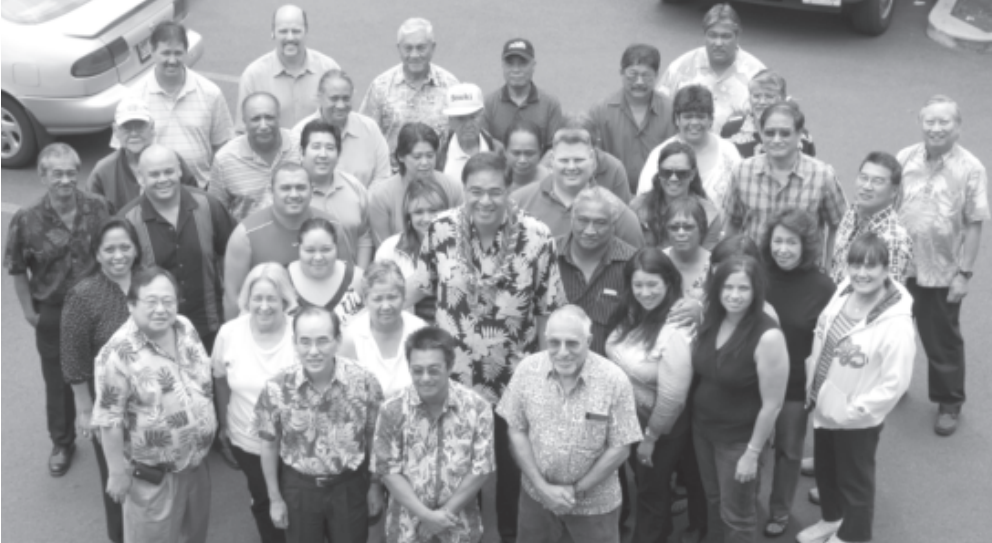On September 18, 2010, Hawaii will hold its Primary Election with Mufi Hannemann and Neil Abercrombie both on the Democratic ballot for Governor. The State will begin mailing absentee ballots to voters after August 13. The ILWU urges all members, their families, and retirees to support and vote for Mufi Hannemann in this Primary Election.

Why Hannemann?
As Governor, Hannemann would bring an exceptional and unique combination of experience, skills, and leadership qualities to the office. Hannemann has extensive executive experience and the know-how that comes from working at all levels of government from the federal, state, and city level and as an executive with a private, local company. Hannemann has the ability to bring different groups together as shown by his successful efforts to push forward a mass transit rail system for Honolulu. Hannemann has shown the ability to work well with neighbor island mayors, with unions and management, and with Democrats and Republicans.
Hannemann knows the diverse people of Hawaii and what it’s like to grow up as a child of immigrant parents in a working class neighborhood. Muliufi Francis Hannemann was born in 1954 and was raised in the working class district of Kalihi on Oahu. His German-Samoan father and Samoan mother were immigrants who worked hard to raise their family of four sons and three daughters. They taught him the On September 18, 2010, Hawaii will hold its Primary Election with Mufi Hannemann and Neil Abercrombie both on the Democratic ballot for Governor. The State will begin mailing absentee ballots to voters after August 13. The ILWU urges all members, their families, and retirees to support and vote for Mufi Hannemann in this Primary Election. value of hard work and education.
Hannemann’s intelligence, personal energy, and drive to succeed earned him scholarships to Iolani School, Harvard University in Massachusetts, and a Fulbright Scholarship to Victoria University of Wellington in New Zealand.
Hannemann continued to gain invaluable experience after completing his education. He returned to Hawaii and taught history and coached basketball at Iolani School. He entered government service in 1978 and demonstrated a rare ability to work with both Republican and Democratic administrations. He served as a special assistant to Democratic President Jimmy Carter in the Department of Interior in Washington D.C. In 1983, he was a special assistant to Republican Vice President George H.W. Bush. In 1993, Democratic President Bill Clinton appointed Hannemann as the United States Representative to the South Pacific Commission as Pacific Islanders began asserting their independence.
a special assistant to Hawaii Governor George Ariyoshi. Between 1984 and 1991, Hannemann worked for C. Brewer, managing the Punaluu Sweetbread Shop and Hawaiian Juices, then as Vice President for Corporate Marketing and Public Affairs for C. Brewer and Company, Ltd.
In 1991, Governor John Waihee III appointed Hannemann to serve in a number of state positions as chair of the Hawaii Pro Bowl Host Committee, chair of the Task Force on Homeporting to get more Naval vessels to use Hawaii as their base, and as director of the Office of International Relations, and as director of the Department of Business, Economic Development and Tourism.
In 1994, Hannemann ran for public office and was elected to the Honolulu City Council from Aiea and Pearl City. He was re-elected in 1998 and was chair of the Council from 1998 to 1999. In 2004, Hannemann ran and was elected as mayor of the City and County of Honolulu.
Mayor of Honolulu
The Honolulu Mayor has a massive and challenging job. The city and county of Honolulu covers the entire island of Oahu and includes more than 75 percent of the State’s population. The City & County has a budget of $1.8 billion dollars, has over 18 departments, and over 10,000 employees. The Mayor must direct a wide range of functions including fire, police, the bus, roads, parks & recreation, emergency services, refuse collection, sewer system, and now the rail project.
Mufi Hannemann has done an outstanding job as Mayor. He took care of essential services and repairs to the hundred year old sewer system. He made tough decisions to manage the City’s spending and budget during the economic crisis.
He has treated city workers fairly and with respect. He helped solve a breakdown in collective bargaining between the State and public workers’ unions. Hannemann worked with the other three county mayors and reached an agreement with the unions, which forced the State to do the same.
It is not an accident that the unions representing almost all city workers have endorsed Hannemann. He has earned endorsements from the Fire Fighters Union, the State of Hawaii Organization of Police Officers, the Teamsters who represent The Bus workers, and the United Pubic Workers who represent refuse and other city workers.
To date, eleven unions have endorsed Hannemann, including the ILWU and construction unions such as the Ironworkers, Painters, Drywall, and Operating Engineers.

